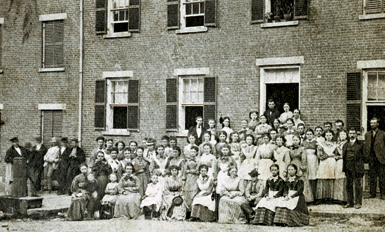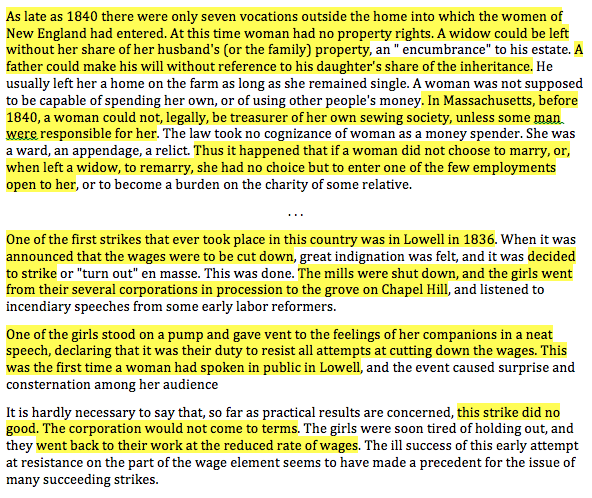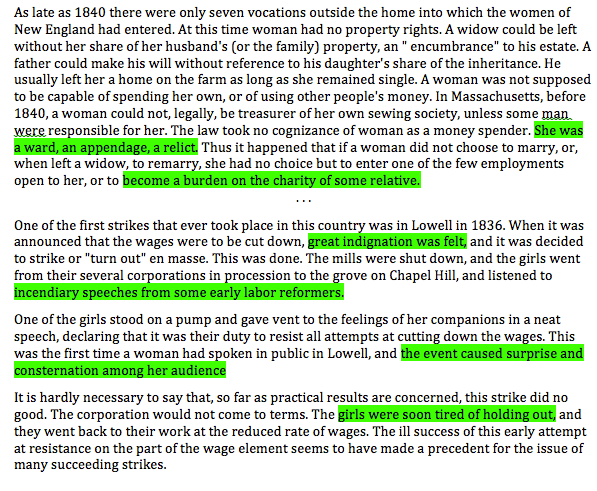Conquer It
In this final activity, you will read another excerpt from Harriet Hanson Robinson's autobiography that details accounts of her working in the textile mills of Lowell, Massachusetts, from 1834 to 1848.
The over-production of textiles led to a drop in prices and profits for the mill owners. As a result, the mill owners cut the workers’ pay by 15% - 20%. This meant that instead of earning $3.00 a week, the women were now earning $2.40 a week.
In the excerpt below, Robinson describes the legal status of women and the first labor strike at the Lowell Mills. As you read the text, use the highlighter tool to mark selections of the text that are examples of fact, opinion and reasoned judgment.

The Lowell Mill Girls left their mark on history and industry, fighting labor rights.
Image credit: National Park Service
Highlighter Tool Tip
To use the highlighter tool, drag your mouse over the word or words you want to select. Once the highlighter color palette appears, click a color and your selected words are now highlighted. Suggestion: Use 3 different highlighter colors – one for facts, one for opinion and one for reasoned judgment. (You can download a PDF of the excerpt to highlight on paper.)
As late as 1840 there were only seven vocations outside the home into which the women of New England had entered. At this time woman had no property rights. A widow could be left without her share of her husband's (or the family) property, an "encumbrance" to his estate. A father could make his will without reference to his daughter's share of the inheritance. He usually left her a home on the farm as long as she remained single. A woman was not supposed to be capable of spending her own, or of using other people's money. In Massachusetts, before 1840, a woman could not, legally, be treasurer of her own sewing society, unless some man were responsible for her. The law took no cognizance of woman as a money spender. She was a ward, an appendage, a relict. Thus it happened that if a woman did not choose to marry, or, when left a widow, to remarry, she had no choice but to enter one of the few employments open to her, or to become a burden on the charity of some relative.
. . .
One of the first strikes that ever took place in this country was in Lowell in 1836. When it was announced that the wages were to be cut down, great indignation was felt, and it was decided to strike or "turn out" en masse. This was done. The mills were shut down, and the girls went from their several corporations in procession to the grove on Chapel Hill, and listened to incendiary speeches from some early labor reformers.
One of the girls stood on a pump and gave vent to the feelings of her companions in a neat speech, declaring that it was their duty to resist all attempts at cutting down the wages. This was the first time a woman had spoken in public in Lowell, and the event caused surprise and consternation among her audience.
It is hardly necessary to say that, so far as practical results are concerned, this strike did no good. The corporation would not come to terms. The girls were soon tired of holding out, and they went back to their work at the reduced rate of wages. The ill success of this early attempt at resistance on the part of the wage element seems to have made a precedent for the issue of many succeeding strikes.
- Harriet Hanson Robinson, "Early Factory Labor in New England," in Massachusetts Bureau of Statistics of Labor, Fourteenth Annual Report, 1883
Source: Fordham University’s Modern History Sourcebook: Harriet Robinson: Lowell Mill Girls
Now assess your ability to distinguish between fact, opinion and reasoned judgment.
What sections of the text are examples of facts used by the author?
What sections of the text are examples of opinion used by the author?










